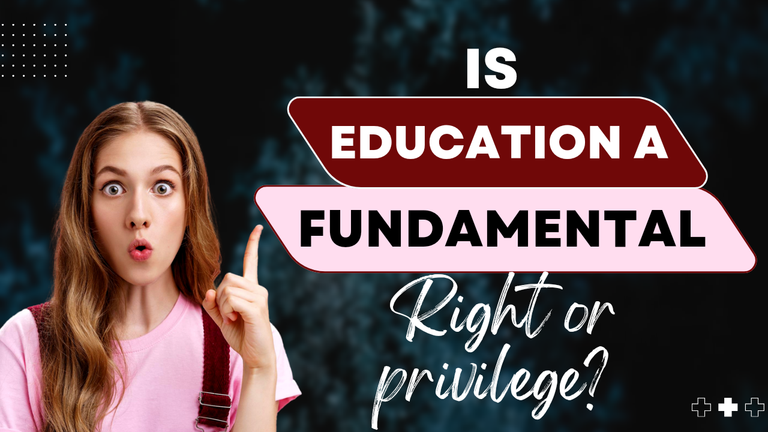Will it not be fit to say that your parents are giving you a privilege to take you to school? I mean, they have the choice to give birth to you and watch you drown in illiteracy of course. On the other hand, don't you think whosoever sponsored your education journey is lucky, very lucky because it is your right to be educated? At this point, the question is, is education a fundamental right or a privilege?
Education is the foundation of every society. Literacy has saved society from many damages that illiteracy would have created. Since education is that necessary tool for personal growth and societal development, the question is, why shouldn't it be a fundamental right?

Designed with Canva
Definitely, the right to education is a fundamental human right. Human rights are those entitlements inherent in every human being by virtue of them being humans. For the fact that I am a human being, I have every right to learn more without restriction on the basis of race, background, gender or whatever factors. Internationally, it has been agreed that education is the right of every person, pursuant to UNESCO's Universal Declaration of Human Rights (1948), its Article 26 clearly states, "everyone has the right to education". With this international law, it can be asserted that my right to education is secure. Nationally, this law has been enacted by my country, Nigeria. Nigeria, being a signatory of this treaty, enacted it into law and it is contained in the Chapter 4 of the 1999 Constitution of the Federal Republic of Nigeria as a fundamental human right. This right is further interested in protecting children's rights to education as in the Child Rights Act (2003). So in my country, I can say that any attempt to hinder my right to education will be viewed as a crime, flouting of the law and is tantamount to punishment by the law.
Education is a right not just because it is constitutionally binding but because the need for education has been understood. What the society is, and what the society will ever be is a product of education. Education is a key that unlocks doors that open more doors. When one is educated, and knowledge gained is applied, a problem is solved and solving a problem is solving many other problems that would have occurred from not solving a single problem.
Viewing education as a privilege will be an unfair analysis. As a privilege, it will be first traced to the historical development of formal education as something that only the elites in the society could afford. Its accessibility was limited and more valued because the common man cannot go or sponsor his ward to school. Contrarily, the counterargument is usually that if education remained a privilege, people would have appreciated its value more than it was right. As a privilege, people will feel opportune to learn and not see it as their rights. With the evolution of initiatives to promote free and compulsory education which is in many parts of the world including Nigeria (for primary and secondary education), students going to government schools only feel it is the obligation of the government to do so, forgetting that they have a role in appreciating education and thinking of possible ways of applying these knowledge to solving global and societal problems. The argument is that the students in these schools are only pious about how much the government can do for them and not how much they can gain from these provisions to the extent of giving back to the society.
It will be convenient to marry education as a privilege and a right in a harmonious way. This is very easy. Education as a right should be re-emphasized in students' ears that this education is a privilege that must be valued. Individuals should be privileged when it comes to getting the fruits of education and making sure they get it to the fullest and as a right, they should make sure they report any case of infringement of their rights when they are not allowed to go to school, not given the adequate attention from their teachers and others. So, these two faces possessed by education can be blended in favour of the students in question. First, they are privileged to be informed and must maximise the gained knowledge. Secondly, they must put it forward as their rights in cases where they are not satisfied. This will help individuals to value education on both ends of being a right and being a privilege.
In all, education provides personal growth and development to a citizen, building one's intellectual, social, moral and financial capacity. The knowledge we gain from school contributes to intelligent decisions we make and often feel could be from our normal thinking faculty. It is education that broadens one's thinking space and makes you sharp enough to make intelligent decisions at different situations.
Additionally, education is a top priority in the global landscape. Countries, States, organisations, companies and other firms are more interested in people that are academically sound. This is simply because they are aware of how much an educated person has to offer intellectually. As an employer, I'd definitely look out for one's educational standing before experience, skills and others. This is because I know with the education the person has gained, such a person should have smart contributions to my firm. So, this is a call to students and others to place value on education. With the evolution of technology, you can even go to school from the comfort of your house. What is essential is being educated.
In conclusion, education is solely a right as much as a privilege and it must be valued by an individual in order to get the best out of it. We must embrace these unified perspectives of education and also focus on education as that universal catalyst that will propel individuals to growth, development and collective prosperity.
Posted Using InLeo Alpha